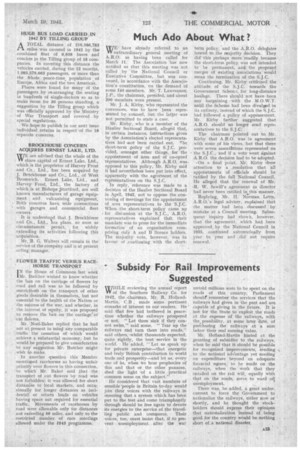Subsidy For Rail Improvements Suggested
Page 17

If you've noticed an error in this article please click here to report it so we can fix it.
WHILE reviewing the annual report of the Southern Railway Co. for 1942, the -chairman, Mr. R. HollandMartin, C.B , made some pertinent remarks of interest to our readers. He' said that few had bothered in peacetime whether the railways prospered or not. "Let them sink if they cannot swim," said some. "Tear up the railways and turn them into roads," said others, .whilst thousands expected, quite rightly, the best service in the world. He added, "Let us speak up for private enterprise—that energetic and truly British contribution to world trade and prosperity—and let us, every
one of when We hear prophecies of this and that or the other panacea, shed the light -of a little practical common sense on the subject."
He considered that vast numbers of sensible 'people in Britain to-day would' join their voices with the railways in ensuring that a system which has been put to the test and come triumphantly through should be free ugain to devote its energies to the service of the travelling public and commerce. Their voices, too, must insist that, if to prevent unernployment after the war
untold millions were to be spent on the roads of this country, Parliament should' remember the services that the railways had given in the past and are capable of giving in the future, It is not for the State to exploit the roads at the expense of the railways, with the, possibility, at some later a'te, of purchasing the railways at a sum below their real earning value.
Mr. Holland-Martin hinted at the granting of subsidies to the railways, when he said that it should be possible for recognized improvements, tending to the national achiantage yet needing an expenditure beyond an adequate financial roturn, to be made on the railways, when the work that they entailed on the rail will, equally with that on the roads, serve to ward of3 unemployment.
There was, he added, a great undercurrent to force the Government to nationalize the railways, either now or shortly, and he thought the stockholders should express their opinions that nationalization instead of being good for the country would be nothing short of, a national disaster.




















































